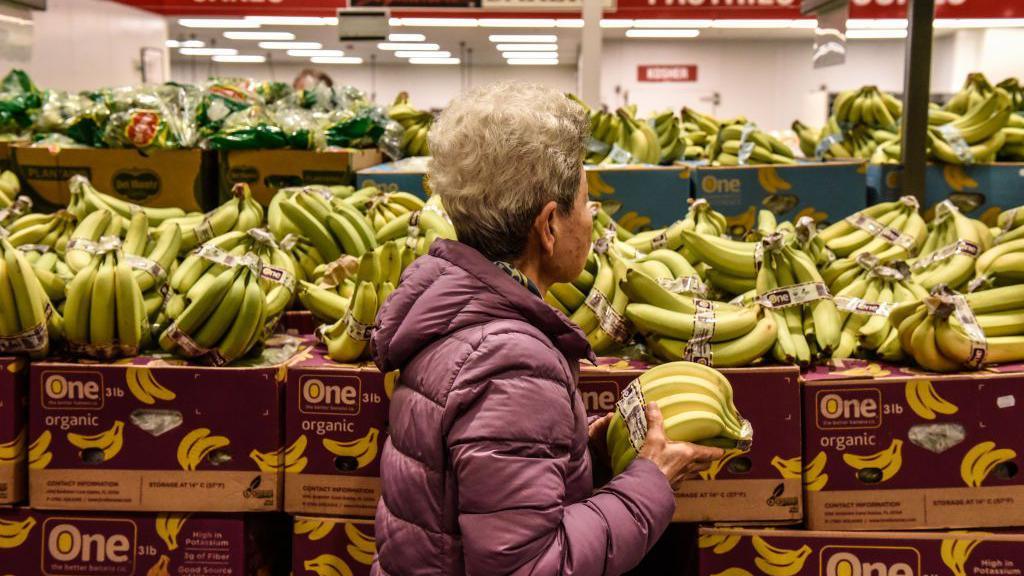“`html
The Trump administration announced Thursday it would lower import taxes on coffee and bananas as part of trade agreements with four Latin American nations.
The agreements, involving Argentina, Guatemala, El Salvador, and Ecuador, come as President Donald Trump faces increased scrutiny regarding his economic policies and growing concerns about affordability.
Under the initial framework, reciprocal tariffs of 10% will remain on goods from Guatemala, Argentina, and El Salvador, along with a 15% tax on imports from Ecuador into the US. However, the deals will exempt products like coffee that are not produced in the US “in sufficient quantities.”
The US-Argentina agreement also addresses market access for beef producers.
President Trump has previously minimized concerns about the cost of living, asserting that the economic outlook had improved during his tenure. He characterized affordability as a “new word” and a “con job” perpetrated by Democrats.
However, he has focused on the issue with renewed urgency following the Republican Party’s disappointing performance in recent off-year elections.
This week, both President Trump and Treasury Secretary Scott Bessent pledged to lower coffee prices, which have risen approximately 20% in the US this year. Secretary Bessent also indicated potential tariff relief on bananas and other fruits.
Senior administration officials specifically identified coffee, cocoa, and bananas as examples of imports from the four Latin American countries that are expected to be exempt from tariffs.
Guatemala and Ecuador are the leading exporters of bananas to the United States.
While the US imports coffee from Central American countries, including Guatemala, Brazil is the top coffee exporter to the US, according to data from the Agriculture Department, and is not included in the trade agreement.
Administration officials cited severe weather as a contributing factor to high prices for coffee and cacao. They expressed hope that prices would decrease to some extent once tariffs are eased, provided retailers and wholesalers pass the savings on to consumers.
In a separate joint statement announcing the framework deal with Argentina, the White House emphasized expanded access to overseas beef markets.
According to the statement, both countries “have committed to improved, reciprocal, bilateral market access conditions for trade in beef.”
The rising cost of beef has become a political issue for President Trump. Last week, he requested that the Justice Department investigate meat-packing companies for their potential role in inflating beef prices, following other recent proposals to lower prices that sparked backlash among ranchers.
Senior administration officials anticipate that the four agreements with Latin American trading partners will be signed within the next two weeks.
These deals originate from President Trump’s April announcement of sweeping new tariffs on numerous countries. Most of these tariffs were suspended amid the ensuing global financial uncertainty.
Nations deemed the “worst offenders” would face higher rates as retribution for what the Trump administration has described as unfair trade policies. New tariff rates for dozens of countries were subsequently introduced in August, following delays to allow for trade negotiations.
The Trump administration has recently reached trade agreements with the European Union, South Korea, Japan, Cambodia, Thailand, and Malaysia.
Trump said on social media he was seeking investigations into Bill Clinton and Larry Summers, as well as JP Morgan and other major banks.
The US has justified its air and naval campaign as necessary to fight drug smuggling into the US.
The deal could end a years-long legal battle over the OxyContin maker’s role in the US opioid crisis.
As US lawmakers debate a wider release of the so-called Epstein files, the BBC asked people in Washington DC if the ongoing saga matters to them.
“There has been too much pretence and performance, and too little action,” says UN human rights chief Volker Türk.
“`

